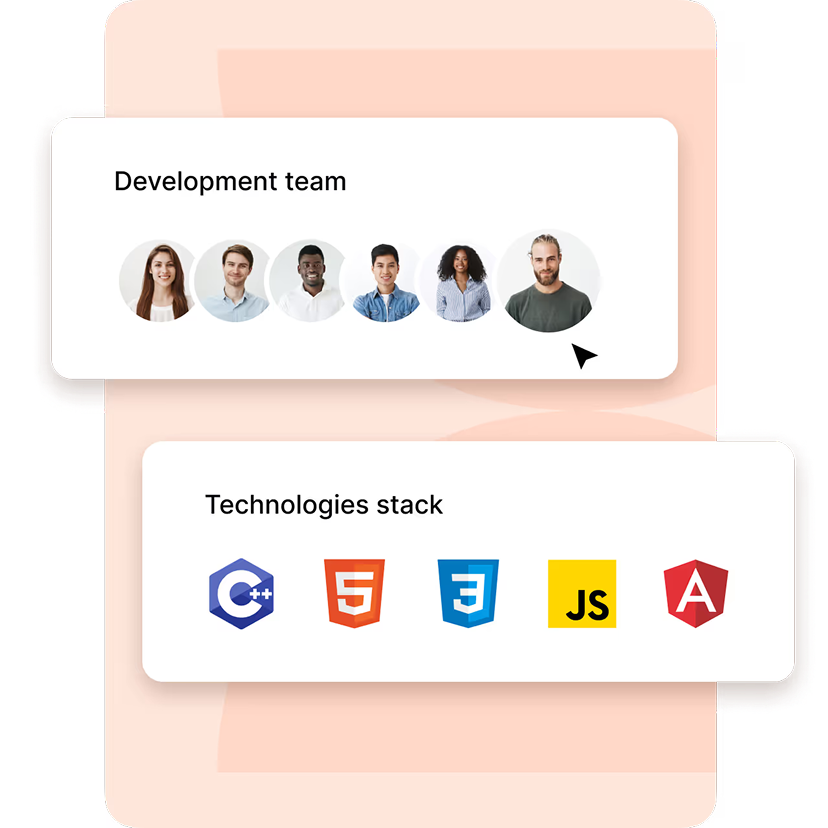Hire Linux Developers
Get a personalized demo now









A Linux developer is a skilled professional adept at designing, implementing, and maintaining software solutions within the Linux operating system environment. These developers are proficient in programming languages such as C, C++, and Python, and possess a deep understanding of the Linux kernel and system architecture. They tackle a myriad of challenges, ranging from optimizing system performance and enhancing security mechanisms to resolving compatibility issues with diverse hardware and software configurations.
Linux, born in 1991 through the visionary efforts of Linus Torvalds, has evolved from a personal project into a global phenomenon. Initially a modest kernel, it swiftly attracted a community of developers drawn to its open-source ethos. As its community flourished, distributions like Red Hat and Debian emerged, offering diverse user experiences. Over the years, Linux has permeated diverse domains, from servers to embedded systems and mobile devices, showcasing its adaptability.
A Linux developer is a tech specialist dedicated to building, maintaining, and optimizing software on the Linux operating system. Their day-to-day work spans system programming, automation, troubleshooting, and ensuring that Linux environments remain secure and high-performing. Excelling in this role requires strong programming skills, hands-on system administration experience, and a deep understanding of Linux internals.
Linux developers offer unique expertise that keeps your business running efficiently and securely.
- Design and implement reliable software solutions tailored for Linux environments.
- Automate everyday system tasks to boost operational efficiency and reduce manual errors.
- Proactively monitor, diagnose, and resolve performance or security issues on Linux systems.
- Integrate and manage network services, virtualization platforms, and container technologies.
- Maintain compliance with security best practices while managing system updates and patches.
- Work closely with cross-functional teams to deliver scalable infrastructure projects.

Linux developers are essential due to the widespread use of the Linux operating system across diverse computing environments, from servers and embedded systems to mobile devices. They address a range of challenges, including optimizing system performance, enhancing security, and resolving compatibility issues. The collaborative nature of open-source development ensures that Linux remains at the forefront of innovation, with developers continuously improving the kernel and contributing to various distributions. Linux's impact is evident in critical sectors, such as web servers, cloud computing, and mobile devices. For instance, the majority of web servers globally run on Linux, highlighting its significance in powering the internet's infrastructure.
Kernel Programming
Enhances system functionality or performance by developing and customizing the Linux kernel.
System Administration
Oversees installation, configuration, and ongoing maintenance of Linux systems to ensure stability.
Bash Scripting
Automates repetitive tasks and system processes using efficient shell scripts.
Networking
Configures and troubleshoots network services and protocols within Linux environments.
Security Hardening
Implements robust security measures to protect Linux systems against vulnerabilities and threats.
Virtualization
Deploys and manages virtual machines and containers to support scalable infrastructure.
Shell Scripting
Writes scripts to streamline workflows and automate complex operations in Linux.
Job titles
System Administrator
Kernel Programmer
DevOps Engineer
Cloud Engineer
Network Administrator
Security Engineer
LinkedIn is a valuable resource for finding and hiring Linux developers, offering a vast network of professionals with diverse skills. You can leverage advanced search filters to target individuals with expertise in Linux, kernel programming, system administration, and related areas. Keywords such as "Linux developer," "DevOps engineer," and "system administrator" can aid in identifying relevant candidates. You can easily look at the LinkedIn profiles and find specific Linux-related skills, endorsements, and recommendations, providing insights into a candidate's capabilities.
Participating in relevant groups and forums allows recruiters to engage with the Linux community and identify potential hires. The platform's messaging and InMail features facilitate direct communication, making it an efficient tool for connecting with and recruiting Linux developers actively seeking new opportunities.
Online job boards
Post job openings on Indeed, LinkedIn, Naukri, Glassdoor, and Stack Overflow Jobs.
Developer communities and forums
Engage with Linux developers on platforms like GitHub, Stack Overflow, and other related forums.
Tech conferences and meetups
Attend Linux related events to network with talented developers. Search for the upcoming regional or global Linux Developer conferences online.
HackerEarth hiring challenges
Sponsor online coding challenges to find competitive developers. For instance, Ford Business Solutions collaborated with HackerEarth to run the Software Embedded Developer Hiring Challenge in 2023, to hire Software Embedded developers with an extensive experience using Linux system building tools.
Open source communities
Engage with active contributors in Linux-related open-source projects. It can help you find good Linux developer portfolios.
Online learning platforms
Connect with Linux development enthusiasts on online learning platforms like Udemy, Coursera, and Udacity.
Local universities and coding boot camps
Collaborate with local academies and educational institutions to find aspiring Linux developers.
Social media channels
Use platforms like Twitter, LinkedIn, and Facebook to share projects and job openings for Linux developers. Engage with Linux communities such as Free Software Foundation, The GNU Project, Linux Kernel Newbies, etc.
Referrals and employee networks
Promote employee referrals and leverage existing networks to gather recommendations.
Hire top tech talent withour recruitment platform
Access Free Demo👍 Pro tip
Reddit is a great place to look for various Linux-related communities, including r/linux, r/linux4noobs, r/linux_programming, r/linuxquestions, r/opensource, etc. You can also join related Communities on Discord with thousands of members.
To hire a Linux Developer, the most common assessment framework on HackerEarth includes.
A combination of technical evaluations, coding exercises, and behavioral assessments. Here are some common components of the assessment framework:
Code completion tasks
Code completion tasks can help you hire Linux developers by assessing their proficiency in relevant programming languages and familiarity with Linux-specific libraries and commands. For instance, evaluating a candidate's completion of tasks involving shell scripting, kernel module development, or system-level programming can gauge their expertise. By incorporating these tasks, you can pinpoint and hire Linux developer who can navigate and optimize code efficiently in a Linux environment.
Multiple-choice questions (MCQs)
MCQs are useful in hiring Linux developers by assessing their knowledge across various aspects of Linux systems. Asking about process management, user permissions, and network configurations helps identify candidates with a comprehensive grasp of Linux administration. Additionally, including questions on common troubleshooting scenarios in a Linux environment can reveal a candidate's problem-solving skills.
Project-specific questions
Project-specific questions can help you hire Linux developers by evaluating their practical experience in relevant scenarios. For instance, asking how a candidate would optimize server performance for a web application running on a Linux environment can showcase their troubleshooting and tuning skills. Inquiring about the implementation of a backup and recovery strategy for a Linux-based server or handling security measures in a specific Linux project can reveal a candidate's real-world application of Linux administration.
Language-specific questions
Language-specific questions are crucial in hiring Linux developers as they assess a candidate's proficiency in languages commonly used in Linux development, such as Bash scripting or Python. For instance, asking a candidate to write a Bash script to automate a routine system task demonstrates their command-line scripting skills. Inquiring about their experience with using Python for system automation or configuration management adds depth to the evaluation.
Our bias-free, objective platform has facilitated 1,00,000+ assessments per month
Get a personalized demo nowCode completion task
- Write a Bash script that reads a log file and extracts unique IP addresses along with the number of occurrences for each address. Display the results in descending order of frequency.
- Create a Python script that pings a list of servers, checks their responsiveness, and logs the results. Implement a retry mechanism for servers that initially fail to respond.
- Write a Bash script that takes a username as input and checks whether the user exists. If the user exists, display their home directory; if not, create the user with a specified home directory.
Multiple-Choice Questions (MCQs)
- What command is used to display the current directory in the terminal?
pwdcdlsdir
- Which file is commonly used for configuring DNS resolution on Linux systems?
/etc/hosts/etc/resolv.conf/etc/network/interfaces/etc/dhcp/dhclient.conf
- Which command is used to search for a specific string in a file?
findgrepsearchlocate
Questions related to Networking and System Security
- Explain the difference between TCP and UDP.
- How would you check the connectivity between two hosts using the ping command?
- What is iptables, and how can it be used to configure a firewall on a Linux system?
- Describe the purpose of SELinux and how it enhances system security.
- How would you secure the SSH service on a Linux server?
Shell Scripting questions
- What is the purpose of a shebang (#!) in a shell script?
- Discuss the importance of using quotes around variables in shell scripts.
- How can you retrieve command-line arguments in a shell script?
- Write a shell script that checks if a file exists and, if not, creates it.
- Explain the significance of the chmod command in the context of file permissions.
👍 Pro tip
These sample questions provided here are for interviewing early-experience talents. For more customized assessments for candidates with higher experience, you can contact our team at contact@hackerearth.com or request a demo here.
Job title
Begin with a clear and concise job title that reflects the role, such as "System Administrator", "Kernel Programmer", and "DevOps Engineer".
Job summary
Provide a brief overview of the position, focusing on the essential responsibilities and objectives. Describe the main aspects of the role and how it contributes to the company's goals.
Responsibilities
Outline the specific tasks and responsibilities that the Linux developer will be expected to handle. This may include:
- System Administration: Installing, configuring, and maintaining Linux systems. Proficient in package management and system optimization. Managing user accounts, permissions, and security configurations.
- Scripting and Automation: Advanced Bash scripting for task automation. Experience with configuration management tools like Ansible. Automation of routine tasks, backups, and log rotations.
- Networking: Configuration and troubleshooting of network services. Understanding of routing, firewall management, and network security principles. Knowledge of TCP/IP networking and protocols.
- Virtualization and Containers: Experience with virtualization technologies (e.g., VMware, KVM). Proficiency in Docker and container orchestration with Kubernetes.
- Security: Implementation of security best practices, including firewalls and monitoring. Regular system patching and updates. Knowledge of encryption techniques and secure communication protocols.
- Troubleshooting and Support: Effective problem-solving skills for diagnosing and resolving system issues. 24/7 system monitoring and on-call support. Collaboration with cross-functional teams to address technical challenges.
Linux Developer Skills and Qualifications
List the essential skills and qualifications that candidates must possess, including, but not restricted to:
- Installation, configuration, and maintenance of Linux systems.
- Proficiency in package management and system optimization.
- Advanced scripting skills, particularly with Bash, for task automation.
- Experience with configuration management tools such as Ansible.
- Automation of routine tasks, backups, and log rotations.
- Experience with virtualization technologies like VMware or KVM.
- Proficiency in containerization platforms such as Docker and Kubernetes.
- Knowledge of encryption techniques and secure communication protocols.
- Collaboration with cross-functional teams to address complex technical challenges.
Preferred skills
Mention any additional skills or qualifications that would be beneficial but not mandatory for the role. You can also ask for experience with specific tools, libraries, or frameworks.
Education and experience
Specify the educational background and professional experience required for the position. This could range from a bachelor's degree in computer science or a related field to several years of relevant experience.
Company culture and EVPs
Briefly highlight your company's culture, values, and any unique perks or benefits offered to employees that can help attract candidates who align with your company's ethos.
Application instructions
Provide instructions on how candidates can apply for the position. Include where to send their resume, portfolio, or other required documents. Also, specify the deadline for applications, if applicable.
Equal Opportunity Statement
Include a statement affirming that your company is an equal opportunity employer committed to diversity and inclusion.
Skill-first hiring requires that the developer interview process be designed to understand the candidate’s skill and experience in the given domain. You can consider the following guidelines when conducting a face-to-face interview with a Linux developer:
Conduct a real-time technical assessment
Usually candidates are given a remote assessment before the interview. However, using the interview platform to assess skills in real time will tell you a lot about the candidate’s communication skills and thought process.
FaceCode is HackerEarth’s flagship tech interview platform with a built-in question library you can use to test the candidate’s knowledge of Linux development concepts. The built-in IDE environment can be used for assessing their ability to write clean, efficient, and maintainable code. You can also use the pair-programming method to observe their problem-solving approach, logical thinking, and attention to detail.
Learn how Facecode can make tech interviews easier
Understand the candidate’s project experience and review the portfolio
During the interview, explore the candidate's past and present projects. Focus on their personal contributions and the skills they used. Ask them to discuss a Linux project, detailing their responsibilities, problem-solving, and collaboration. If available, review their portfolio or code samples for coding style, documentation, and project quality.
Understand if they are a good culture and team fit
While technical skills are essential for a developer, the significance of cultural fit should not be overlooked. The ideal candidate must possess not only accurate coding abilities but also effective communication and collaboration skills to thrive in agile and collaborative environments. Evaluating a candidate's capability to work both independently and collaboratively in a team is crucial. This assessment provides valuable insights into the candidate's problem-solving skills, communication, and adaptability, helping to determine their fit for the role and the team dynamics.
United States
Salaries are highest in major cities and for developers with advanced Linux expertise, particularly in industries such as finance, cloud infrastructure, and high-performance computing.
- Average Annual Salary: $100,522–$156,000 per year
- Entry-Level: $82,400–$100,000 per year
- Mid-Level: $100,000–$115,000 per year
- Senior-Level: $126,000–$184,000+ per year
United Kingdom
London and other major cities offer higher salaries, particularly for senior roles or those with advanced Linux and DevOps skills.
- Median Annual Salary: £55,000–£62,300 per year
- Entry-Level: £37,500–£45,000 per year
- Mid-Level: £55,000–£68,400 per year
- Senior-Level: £72,500–£100,000+ per year
Australia
Salaries are highest in Sydney and Melbourne, with top pay for experienced and senior developers, especially in organizations focusing on performance-critical or enterprise applications.
- Average Annual Salary: A$107,000–A$116,772 per year (Sydney)
- Entry-Level: A$90,000–A$104,000 per year
- Mid-Level: A$105,000–A$125,000 per year
- Senior-Level: A$130,000–A$159,000+ per year
What qualifications should I look for in a Linux Developer?
When seeking a Linux Developer, prioritize candidates with a strong foundation in Linux system administration, proficient scripting skills (particularly in Bash), and experience with configuration management tools such as Ansible. Look for individuals well-versed in networking concepts, including TCP/IP, DNS, and firewall management. Familiarity with virtualization technologies (e.g., VMware, KVM) and containerization platforms like Docker and Kubernetes is beneficial. Security expertise, encompassing best practices, patching, and encryption, is crucial.
Do we require the candidate to have experience in all the necessary tools or just one is enough?
While having experience in all necessary tools is advantageous, it is not always a strict requirement for a Linux Developer. Proficiency in at least one configuration management tool (e.g., Ansible, Puppet, Chef) and one containerization platform (e.g., Docker, Kubernetes) is often sufficient. However, a candidate's ability to quickly adapt and learn new tools is equally crucial, as the technology landscape evolves.
What are the skillsets of a System Administrator?
A proficient System Administrator possesses a comprehensive skill set covering Linux and Windows environments, including installation, configuration, and maintenance. Expertise in scripting languages such as Bash and PowerShell is crucial for automation and efficient system management. System Administrators should be adept at managing user accounts, permissions, and security configurations, with a deep understanding of networking protocols, firewall administration, and network services.
How to assess a candidate's real-world project-handling skills?
To assess a Linux developer's real-world project-handling skills, consider conducting a technical interview that delves into their practical experience. Request the candidate to describe specific projects they've undertaken, emphasizing challenges faced, architectural decisions made, and how they addressed complex issues.
How does the requirement for Linux developer skills change across various job roles?
The demand for Linux developer skills varies across job roles, reflecting diverse responsibilities within the IT landscape. System Administrators primarily require expertise in Linux system configuration, maintenance, and security. DevOps Engineers extend these skills to incorporate automation, scripting, and infrastructure as code. Cloud Engineers and Architects necessitate proficiency in deploying and managing Linux-based cloud environments. Kernel Developers focus on low-level Linux internals and custom module development.





.png)
.png)
.png)
.png)
.png)
.png)
.png)












